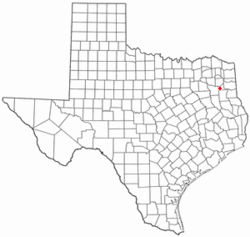
Liberty City, Texas

Liberty City, Texas | |
|---|---|
 Location of Liberty City, Texas | |
 | |
| Coordinates: 32°27′01″N 94°56′38″W / 32.45028°N 94.94389°W | |
| Country | United States |
| State | Texas |
| County | Gregg |
| Area | |
• Total | 6.10 sq mi (15.80 km2) |
| • Land | 6.09 sq mi (15.78 km2) |
| • Water | 0.008 sq mi (0.02 km2) |
| Elevation | 390 ft (120 m) |
| Population (2020) | |
• Total | 2,721 |
| • Density | 386/sq mi (149.0/km2) |
| Time zone | UTC-6 (Central (CST)) |
| • Summer (DST) | UTC-5 (CDT) |
| ZIP code | 75662 or 75647 |
| Area code(s) | 903, 430 |
| FIPS code | 48-42616[2] |
| GNIS feature ID | 2408607[1] |
Liberty City is a census-designated place (CDP) in Gregg County, Texas, United States. The population was 2,721 at the 2020 census,[3] an increase over the figure of 2,351 tabulated in 2010.

Geography
Liberty City is located in western Gregg County. Interstate 20 forms the southern edge of the CDP, with access from Exits 582 and 583. Texas State Highway 135 runs through the eastern side of Liberty City, leading north 8 miles (13 km) to Gladewater and southeast 6 miles (10 km) to Kilgore. Liberty City is 15 miles (24 km) southwest of the center of Longview and 24 miles (39 km) northeast of Tyler.

According to the United States Census Bureau, the CDP has a total area of 6.1 square miles (15.8 km2), of which 0.01 square miles (0.02 km2), or 0.13%, are water.[3]

Demographics
| Census | Pop. | Note | %± |
|---|---|---|---|
| 2020 | 2,721 | — | |
| U.S. Decennial Census[4] 1850–1900[5] 1910[6] 1920[7] 1930[8] 1940[9] 1950[10] 1960[11] 1970[12] 1980[13] 1990[14] 2000[15] 2010[16] | |||
| Race | Number | Percentage |
|---|---|---|
| White (NH) | 2,199 | 80.82% |
| Black or African American (NH) | 114 | 4.19% |
| Native American or Alaska Native (NH) | 8 | 0.29% |
| Asian (NH) | 9 | 0.33% |
| Pacific Islander (NH) | 2 | 0.07% |
| Some Other Race (NH) | 12 | 0.44% |
| Mixed/Multi-Racial (NH) | 107 | 3.93% |
| Hispanic or Latino | 270 | 9.92% |
| Total | 2,721 |
As of the 2020 United States census, there were 2,721 people, 754 households, and 689 families residing in the CDP.

As of the census[2] of 2000, there were 1,935 people, 690 households, and 569 families residing in the CDP. The population density was 493.0 inhabitants per square mile (190.3/km2). There were 747 housing units at an average density of 190.3 per square mile (73.5/km2). The racial makeup of the CDP was 93.02% White, 4.50% African American, 0.36% Native American, 0.16% Asian, 1.03% from other races, and 0.93% from two or more races. Hispanic or Latino of any race were 2.69% of the population.

There were 690 households, out of which 41.3% had children under the age of 18 living with them, 67.8% were married couples living together, 10.4% had a female householder with no husband present, and 17.5% were non-families. 14.5% of all households were made up of individuals, and 7.0% had someone living alone who was 65 years of age or older. The average household size was 2.80 and the average family size was 3.09.

In the CDP, the population was spread out, with 28.5% under the age of 18, 8.2% from 18 to 24, 27.8% from 25 to 44, 24.4% from 45 to 64, and 11.2% who were 65 years of age or older. The median age was 36 years. For every 100 females, there were 92.7 males. For every 100 females age 18 and over, there were 92.2 males.

The median income for a household in the CDP was $55,000, and the median income for a family was $55,913. Males had a median income of $36,250 versus $22,880 for females. The per capita income for the CDP was $20,443. About 1.5% of families and 1.9% of the population were below the poverty line, including 1.7% of those under age 18 and none of those age 65 or over.

Education
Liberty City is served by the Sabine Independent School District. The district's mascot is the Cardinal.

References
- ^ a b U.S. Geological Survey Geographic Names Information System: Liberty City, Texas
- ^ a b "U.S. Census website". United States Census Bureau. Retrieved January 31, 2008.
- ^ a b "Geographic Identifiers: 2010 Demographic Profile Data (G001): Liberty City CDP, Texas". American Factfinder. U.S. Census Bureau. Retrieved March 23, 2017.[dead link]
- ^ "Decennial Census by Decade". United States Census Bureau.
- ^ "1900 Census of Population - Population of Texas By Counties And Minor Civil Divisions" (PDF). United States Census Bureau.
- ^ "1910 Census of Population - Supplement for Texas" (PDF). United States Census Bureau.
- ^ "1920 Census of Population - Number of Inhabitants - Texas" (PDF). United States Census Bureau.
- ^ "1930 Census of Population - Number of Inhabitants - Texas" (PDF). United States Census Bureau.
- ^ "1940 Census of Population - Number of Inhabitants - Texas" (PDF). United States Census Bureau.
- ^ "1950 Census of Population - Number of Inhabitants - Texas" (PDF). United States Census Bureau.
- ^ "1960 Census of Population - Number of Inhabitants - Texas" (PDF). United States Census Bureau.
- ^ "1970 Census of Population - Number of Inhabitants - Texas" (PDF). United States Census Bureau.
- ^ "1980 Census of Population - Number of Inhabitants - Texas" (PDF). United States Census Bureau.
- ^ "1990 Census of Population - Population and Housing Unit Counts - Texas" (PDF). United States Census Bureau.
- ^ "2000 Census of Population - Population and Housing Unit Counts - Texas" (PDF). United States Census Bureau.
- ^ "2010 Census of Population - Population and Housing Unit Counts - Texas" (PDF). United States Census Bureau.
- ^ "Explore Census Data". data.census.gov. Retrieved May 25, 2022.
- ^ https://www.census.gov/ [not specific enough to verify]
- ^ "About the Hispanic Population and its Origin". www.census.gov. Retrieved May 18, 2022.
See what we do next...
OR
By submitting your email or phone number, you're giving mschf permission to send you email and/or recurring marketing texts. Data rates may apply. Text stop to cancel, help for help.
Success: You're subscribed now !

